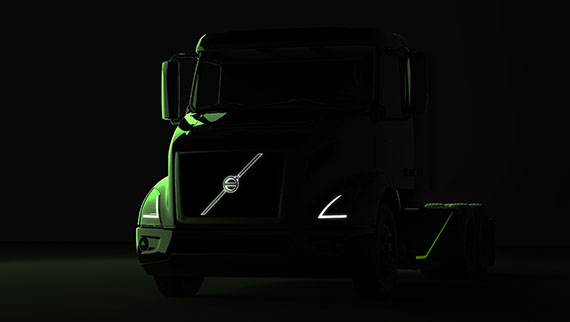
-
A teaser photo of Volvo’s VNR all-electric truck that the company says will debut in 2019.
-
A shadowy profile view of the semi to come.
-
According to Volvo, “The Volvo VNR Electric will be based on fully-electric powertrain technology currently being used in the Volvo FE Electric, which… will begin selling in Europe in 2019.
-
Possibly the slickest-looking vanity photo of a garbage truck that you’ll ever see.
On Wednesday, Volvo Trucks North America announced that in 2019 it will demonstrate an all-electric Volvo semi truck, which it expects to go into production in 2020.
The semi will be an all-electric VNR, similar to Volvo’s current diesel VNR model, and it will be used for regional-haul operations as well as drayage (that is, transporting shipping containers from barges to their next mode of transport).
Volvo has announced two other electric vehicles in the past: the Volvo FL Electric, which is a smaller “urban transport” truck, as well as the recently announced Volvo FE, an all-electric garbage truck. The VNR will be built using the same motor and battery system as the Volvo FE. In its press release, Volvo stressed its company-wide electric capabilities, saying that its sister company, Volvo Buses, “has sold more than 4,000 electrified buses since 2010.”
The details on the VNR’s haul capacity, battery size, and estimated price are still unknown (Volvo PR did not respond to our request for comment). But the truck looks like it will be debuted at a time when the competition between low-emissions semi makers will be fierce. Tesla’s electric semi, which has already been spotted on California roads, is set to hit production in 2019. Fuel cell trucks from Nikola Motors are also expected to debut in 2019 and hit the roads in 2021.
The Volvo all-electric VNR will debut in California, because development of the semi was part of the state’s LIGHTS (Low Impact Green Heavy Transport Solutions) program. Volvo has worked with California to develop greener drayage solutions before: in 2017, Volvo worked with Siemens and California’s South Coast Air Quality Management District to develop a diesel-hybrid truck that could move shipping containers either via an electric catenary system or via the truck’s diesel motor. Funds for the LIGHTS program have gone to a number of companies, and they come from the state’s cap-and-trade program, which sells carbon allowances to major industry polluters.
In 2017, Volvo’s passenger car branch announced that it would no longer develop cars with diesel engines. A few months later, the company said that all passenger cars developed from 2019 on would be electric or hybrid vehicles.
Listing image by Volvo
https://arstechnica.com/?p=1427967

